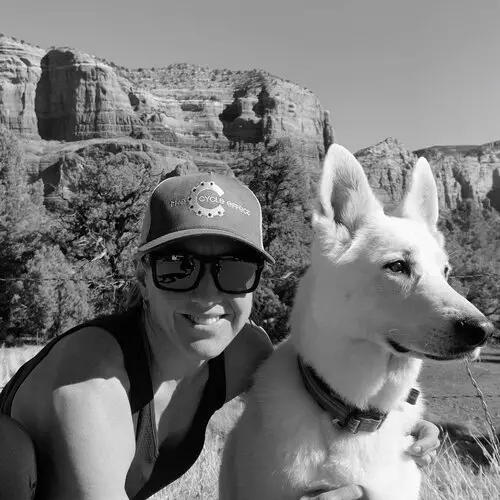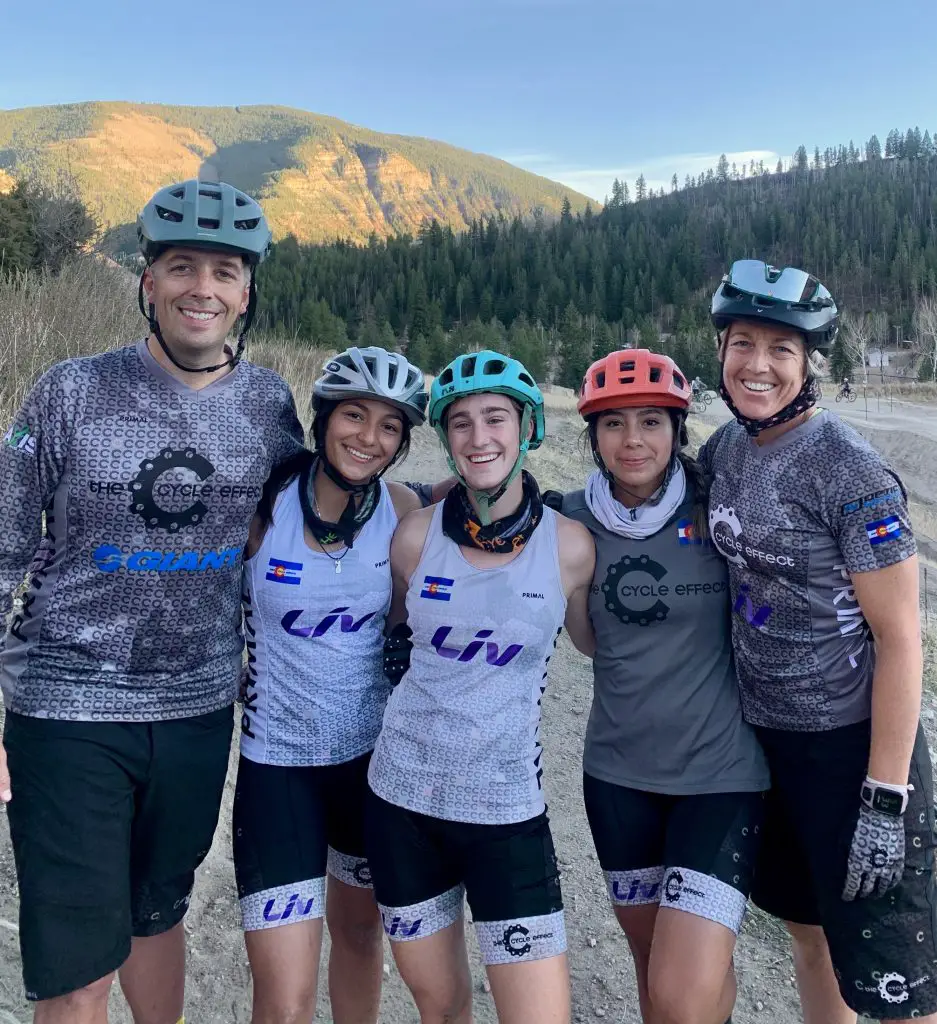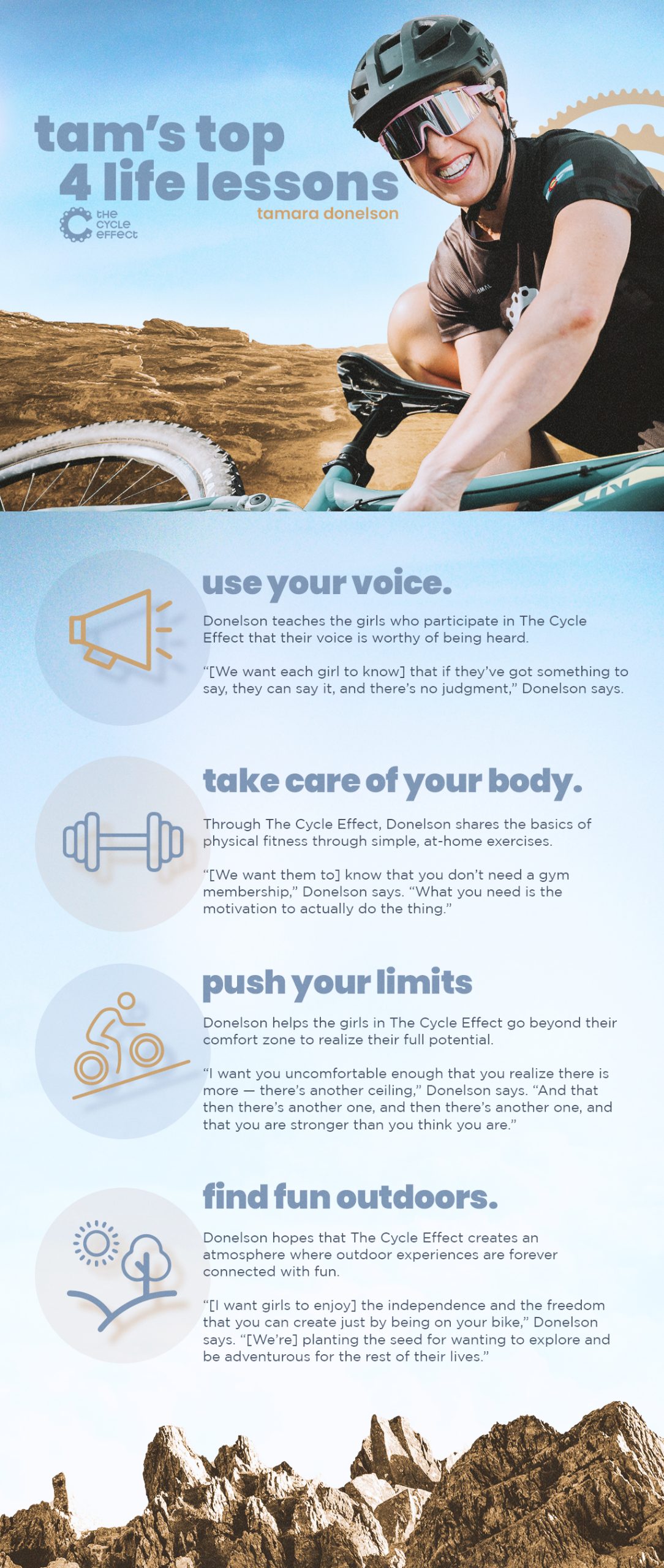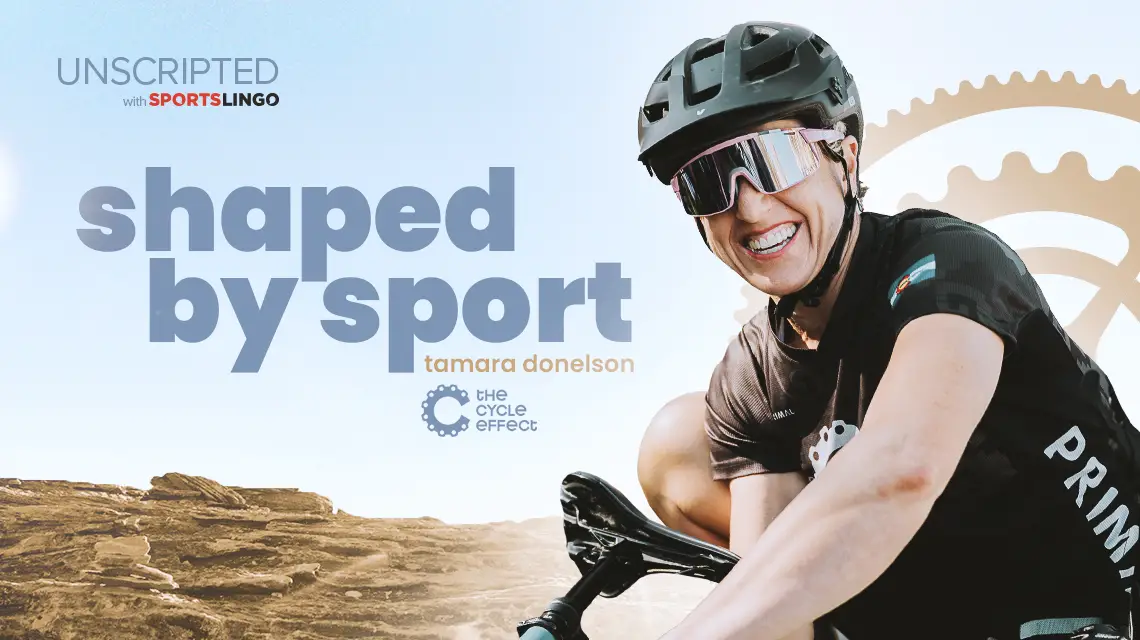How Tamara Donelson fell in love with mountain biking in spite of herself — and why she stepped back from the sport she loved to rediscover fun on her own terms
Be careful.
Get down from there.
Don’t do that.
Many young girls are taught to fear or avoid daring athletic pursuits.
In fact, one study found parents are four times more likely to tell girls to “be more careful” compared to boys. This conditioning can lead girls to be more hesitant to participate in sports and try new things.
Not so for Tamara “Tam” Donelson, a professional mountain biker and triathlete, and co-founder of The Cycle Effect — a nonprofit focused on developing girls’ confidence and self-esteem via mountain biking based out of Eagle, Colorado.
“Our upbringing was: ‘Try everything and anything,’” Donelson says. “Sports were always encouraged. … I would climb a tree and my dad would be like, ‘Go to the next branch. Keep going.’ It was no holds barred.”
As a young girl growing up in Australia, Donelson heeded her Dad’s advice. She played softball, field hockey, and water polo. She surfed, skied, did gymnastics, and joined a diving team. As an athlete, she was naturally talented and could pick up most sports quickly. And as her confidence in her athletic ability grew, so did her confidence in herself.
“Confidence builds more confidence,” she says. “I enjoy being good at things. I’m quite competitive.”
Those early athletic pursuits set the stage for the rest of Donelson’s life.
Today, she works as a personal trainer at the Athletic Club at the Westin in Avon, Colorado; runs her own coaching business, Donelson Coaching; and serves as head coach of The Cycle Effect. She’s an ACE Certified Personal Trainer, USA Triathlon Coach, USA Cycling and Mountain Biking Coach, and APSI Full Certification Ski Instructor.
She’s also a pro mountain bike racer with a slew of podium finishes in everything from endurance mountain bike races to 12-hour solo races and team races. In 2010, Donelson was crowned the overall National and World Xterra Female Amateur Champion.
In spite of her talent for mountain biking, Donelson didn’t initially take to the sport. And in spite of her success, she stepped back from pro racing at the height of her career.
We chatted with Donelson about the journey that led to her unexpected mountain bike career, how she fell out of love with the sport, what she did to rediscover the joy of mountain biking, and how she’s passing along those lessons to the girls she coaches.
Life on skis
After high school, Donelson did a year of business school training, then took a role as a receptionist. She quickly learned that sitting still all day didn’t work for her.
“All I’d be thinking of was my one-hour lunch when I could go run,” she says.
She quit her admin job after just six months and went on a five-week trip to Whistler Blackcomb, one of North America’s premier ski destinations. While she was there, she completed her Level 1 ski instructor certificate. She took a job at the resort’s ski school and ended up staying for the rest of the season.
For the next decade or so, Donelson followed winters around the globe, teaching at ski schools in several countries. During this time, Donelson met her future husband and The Cycle Effect’s co-founder, Brett Donelson.
After a couple years of chasing winters at different resorts, the duo wanted to be in the same place at the same time. Brett took a 10-month contract at Ski and Snowboard Club Vail, and for the first time ever, the couple experienced summer together in Colorado’s Rocky Mountains.
In need of a summer sport, Donelson started road biking during the ski school’s off-season and eventually dabbled in road triathlons.
“And that’s when [Brett] was like, ‘You catch them all on the bike,’” Donelson says. “‘Maybe we should give this mountain biking thing a go.’”

Photo courtesy of The Cycle Effect
“I will not get on a bike”
Donelson’s early foray into mountain biking was extremely short-lived. On one of her first rides, she crashed.
“I got five stitches in my face,” she says. “I still have the road rash on my elbow and my side.”
It was the first time Donelson had tried a new sport and didn’t take to it immediately.
“After [the crash], I did not want anything to do with mountain biking,” she says. “I was like, ‘I will not get on a bike.’”
She did try a few more rides, but her confidence had taken a major hit. While riding, she often felt wobbly and out of control.
“I had this foreign sense in me of being really scared of something,” she says. “And I was like, ‘I don’t like this. I’m not doing this anymore.’ Because I wasn’t good at it. I was scared. And I don’t know what this feeling is, right? I don’t like it. And I don’t really want to address it. We’ll just move on. We’ll just put that in the cupboard.”
Losing the fun
Mountain biking stayed in “the cupboard” for another three years. But Brett had seen something in Donelson, and he kept encouraging her to try a race because it would bring out her competitive spirit.
“In the end, he was relentless,” Donelson says. “And I’m like, ‘Fine. I will do this stupid race.’”
Donelson signed up for the mountain bike race. And it turned out Brett was right.
“I came back with the biggest grin,” she says. She signed up for more races. “And every race, I tended to get better.”
So much better, in fact, that Donelson won the beginner series in her first year of mountain bike racing. In 2009, she started competing in Xterra races and quickly made a name for herself. In only her third year of racing the Xterra Off-Road Triathlon, Donelson was crowned the Overall Amateur Xterra Regional, National, and World Champion. In 2012, she made the leap to race the Xterra Triathlon professionally.
But after years of professional mountain biking, Donelson says the training regimen was starting to take a toll.
“After a while … it is all-consuming,” she says. “I tend to do all or nothing. [After four or five years of doing Xterra], I got to the point where it wasn’t fun anymore.”
Donelson’s mental health started to suffer. She found herself dealing with body image issues and struggling to make time for the relationships that mattered to her on top of her demanding training routine.
“I started to pick myself apart … and it wasn’t about having fun anymore,” she says. “It was about: ‘Do I look “Pro”? And do I fit this mold that I’ve now put myself into?’ There were a lot of [thoughts like], ‘I don’t deserve to be at that level’ because maybe I don’t look a certain way or I don’t have sponsors.”
Pro racing also came with a financial cost. Mountain bikes aren’t cheap, and neither was the travel required to stay on the racing circuit.
Things changed for the better during an emotional conversation with Brett.
“I’ll never forget this,” Donelson says. “He said, ‘You know, you could be miserable for free.’”
Those words stuck with Donelson. “I thought about it and I [decided], ‘Yeah, I’m done. Let’s do something different.’”

Photo courtesy of The Cycle Effect
New chapter
At first, “something different” looked like signing up only for races that Donelson hadn’t done before.
“So I couldn’t compare a split from one year to the other,” she explains.
With some of the competitive pressure lifted, Donelson says, “It was so much more fun.”
Another change came when the Donelsons decided to co-found The Cycle Effect, a nonprofit that strives to provide brighter futures to young women through mountain biking.
You can learn more about The Cycle Effect’s evolution in our interview with Brett Donelson.
For Tam’s part, she wanted to start The Cycle Effect to share the benefits she’d gained from a life of sport.
“I saw the advantages of how much sport really shaped me and made me feel powerful and confident,” she says. “I just loved it so much. I was like, everybody should do this. Let’s share the love.”
Today, Donelson balances her work as a personal trainer with working part-time as The Cycle Effect’s head coach. She’s found that the lessons she’s gone through in her athletic career show up time and time again in the conversations she has with the girls she coaches.
Take body image.
“I have to be cognizant of my language [around the girls],” Donelson says. “There’s a certain point where they’re going to end up possibly picking apart their body, if they’re not already there. … So, I’m just trying to instill, you need to be fulfilled. You need to enjoy the sport. You need to believe in yourself and have confidence in your abilities. And if it’s not fun, you should maybe step away — which is exactly what I did from Xterra.”
Other lessons have come through working with girls whose childhoods were much different than Donelson’s.
“[For a while] it didn’t dawn on me that other people weren’t raised in the same environment of positive reinforcement and encouragement to do sports,” Donelson says. “Because that was my experience, I thought that was everybody else’s experience.”
But when she started coaching girls through The Cycle Effect, Donelson noticed that girls would frequently share that her positive reinforcement about their athletic potential was the first they’d ever received.
“It hurts me to think that [these girls haven’t heard that before] — like ‘Really, you’re so good at this and you’re so good at that,’” Donelson says. “I’m guessing that’s partly why the girls keep coming back.”
Imparting wisdom
The Cycle Effect prioritizes learning on several fronts: physical wellness, community impact and mentorship, and building brighter futures. The organization is premised on the idea that when girls regularly participate in programs that build their self-esteem and promote overall wellness, they’re more likely to be healthy, stay engaged in school, and set goals that support their future.
For Donelson’s part, she hopes each girl who participates in The Cycle Effect comes away from the experience having learned (at a minimum) four important lessons:
1. Your voice is worthy of being heard. Donelson strives to make The Cycle Effect “such a safe environment that they don’t question who is going to show up. They know that every Monday and Wednesday, the same people will be there.”
“So we’re pretty diligent about keeping our volunteer pool small but really consistent. Because if you’re not consistently there, they’re not going to open up,” Donelson says. “[We want each girl to know] that if they’ve got something to say, they can say it, and there’s no judgment.”
2. You have the skills you need to stay healthy for the rest of your life. The Cycle Effect’s participants don’t just learn mountain biking skills. The program also teaches functional fitness strategies so the girls know how to do their own workouts at home through a combination of lunges, squats, resistance band work, and so on.
“[We want them to] know that you don’t need a gym membership,” Donelson says. “What you need is the motivation to actually do the thing.”
3. You can thrive beyond discomfort. “My job is to squeeze that little bit more out of you and … try to find how far I can push you to get the most amount of performance out of you without pushing it too far,” Donelson says. “Because that’s where you start to see change. I want you uncomfortable enough that you realize there is more — there’s another ceiling. And that then there’s another one, and then there’s another one, and that you are stronger than you think you are.”
4. You can make your own fun. “[I want girls to enjoy] the independence and the freedom that you can create just by being on your bike,” Donelson says. “[We’re] planting the seed for wanting to explore and be adventurous for the rest of their lives. … Hopefully then they realize that they feel so good in nature and outside [and] that’s a good thing to continue to do. Just give them the experience and relate that to fun, and that’s going to be anchored for the rest of their lives.”
The Cycle Effect’s participants are learning these lessons all the time, and Donelson says their success stems in large part from the power of a supportive community.
“When you’re doubting whether you really are strong, [it is so powerful to have] somebody standing in front of you saying, ‘Unconditionally, I believe in you. I know you can do this,’” Donelson says.
That kind of support is what has kept her showing up on her bike and in life, and she’s always striving to pay it forward.
“I love being part of that experience and that growth,” Donelson says. “Because it’s just as satisfying to watch somebody else do it as it is [to grow myself] … Success, you know, it should be shared. It’s so much better when it is.”

